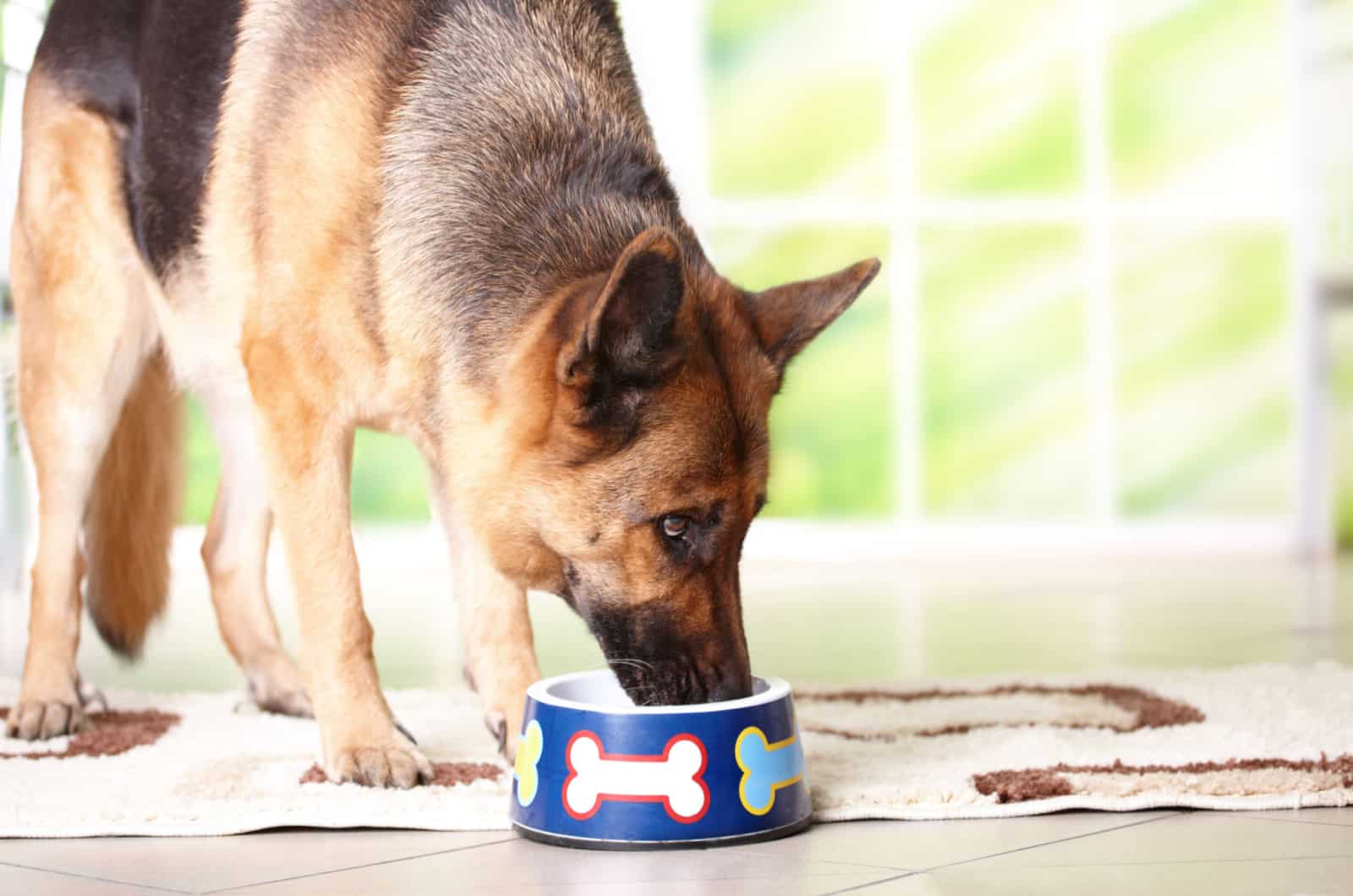I see you want to learn a thing or two about German Shepherd raw diet habits.
You’re in the right place because you won’t find a more helpful guide on the Internet.
PupVine’s proud to present to you all the tips and tricks, and dos and dont’s of a raw diet for our German Shepherd buddies.
Ever since ancient times, dogs used to eat raw. Dry dog food and food cans didn’t exist back then. The first commercial dog food appeared back in 1860. But, our canine buddies didn’t starve from hunger.
Do you know what they ate?
Meat, mostly.
The first dogs were carnivores. They still are carnivores, but we found a way to enrich their diet with something other than pure proteins. Today’s pups eat fruits, veggies, herbs, and grains, too!
Even though we have come a long way from poorly-produced dog kibble, we’re still finding it hard to discover the ideal dog food brand. A lot of brands use recipes that I would never feed my dog. If the formula’s good, the price is bad. You can never find the ideal combination.
And, even if you do, chances are your GSD won’t respond well to it. Cleaning puppy diarrhea from the carpet just because your dog doesn’t find that food good for him is not the best idea ever, right?
Many dog owners had to turn to other solutions, including introducing their German Shepherds to a raw diet.
I can say with every right that the raw diet has a lot of hype. But, is it really that beneficial? Can it meet the needs of a large dog like our German Shepherd? And, what are those big downsides that everyone’s talking about?
Stay tuned and I’ll give you all the information… raw.
What Even Is A Raw Diet For Dogs?
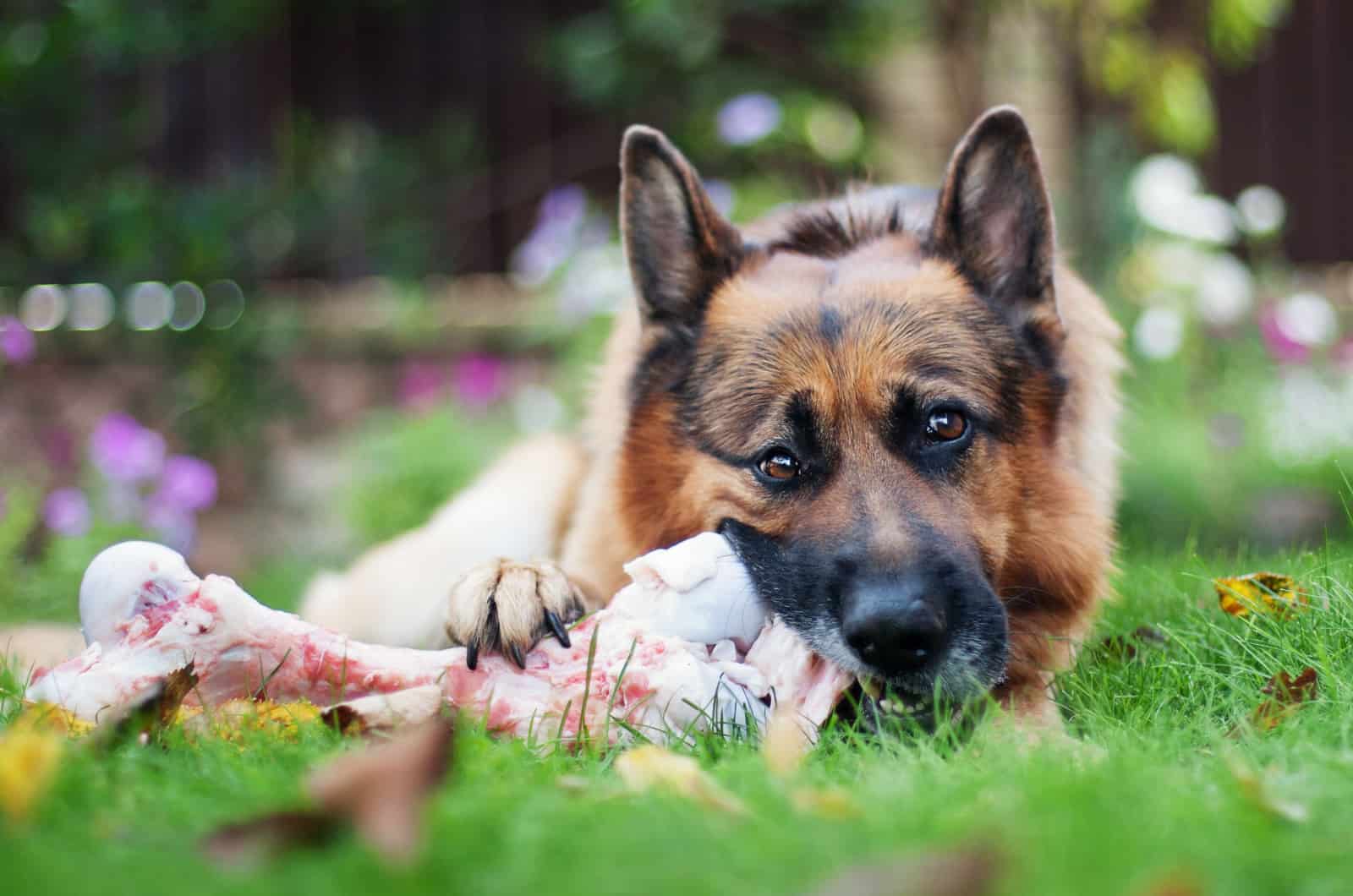
When we talk about raw dog food (or German Shepherd raw diet), we must come across this term: BARF – Biologically Appropriate Raw Food.
What does that mean?
The term stands for raw meals for your dog that are designed completely to his needs. A German Shepherd may share the same raw diet habits as a Cane Corso, but in no way will he share the same needs as a Maltese dog.
Specially curated raw diet recipes are there to help us replicate the diet that our canine friends used to have in ancient times. Seems like everything was better before, right?
Well, the raw diet is pretty close to it.
These meals have two purposes: to suit the dog’s natural instincts, and to make his belly nice, full, and satisfied.
But, a raw meal isn’t just a bowl full of raw meat. Use your imagination. There’s so much more to raw dog food.
Types Of Raw Diet Meals
Have you seen kibble brands advertising freeze-dried bits of meat in their recipes? That’s one of the ways of preserving and serving raw food.
Of course, we have frozen raw food, which gets thawed and served to a dog when needed. Those meals include meat only… something that a dog could find if he gets left on his own in the wild. These meals belong to the term known as PMR or Prey Model Raw food.
PMR meals don’t contain fruits like berries or veggies like sweet potatoes. Meat and bones are the only ingredients.
And lastly, there’s homemade food, which are more complex meals where you do your best to cook for your dog and serve him a bunch of carefully-selected ingredients.
An average raw meal should consist of meat, bones, animal organs, eggs, fruits, and vegetables that are safe for your dog, as well as dairy products.
Of course, you can tweak recipes and find what your dog likes the most.
All in all, we can’t help but notice how many goodies a dog gets to eat when he eats raw.
Read More: Why Does My German Shepherd Lay Down To Eat? 9 Reasons
Should You Feed Your German Shepherd Raw Diet Meals?
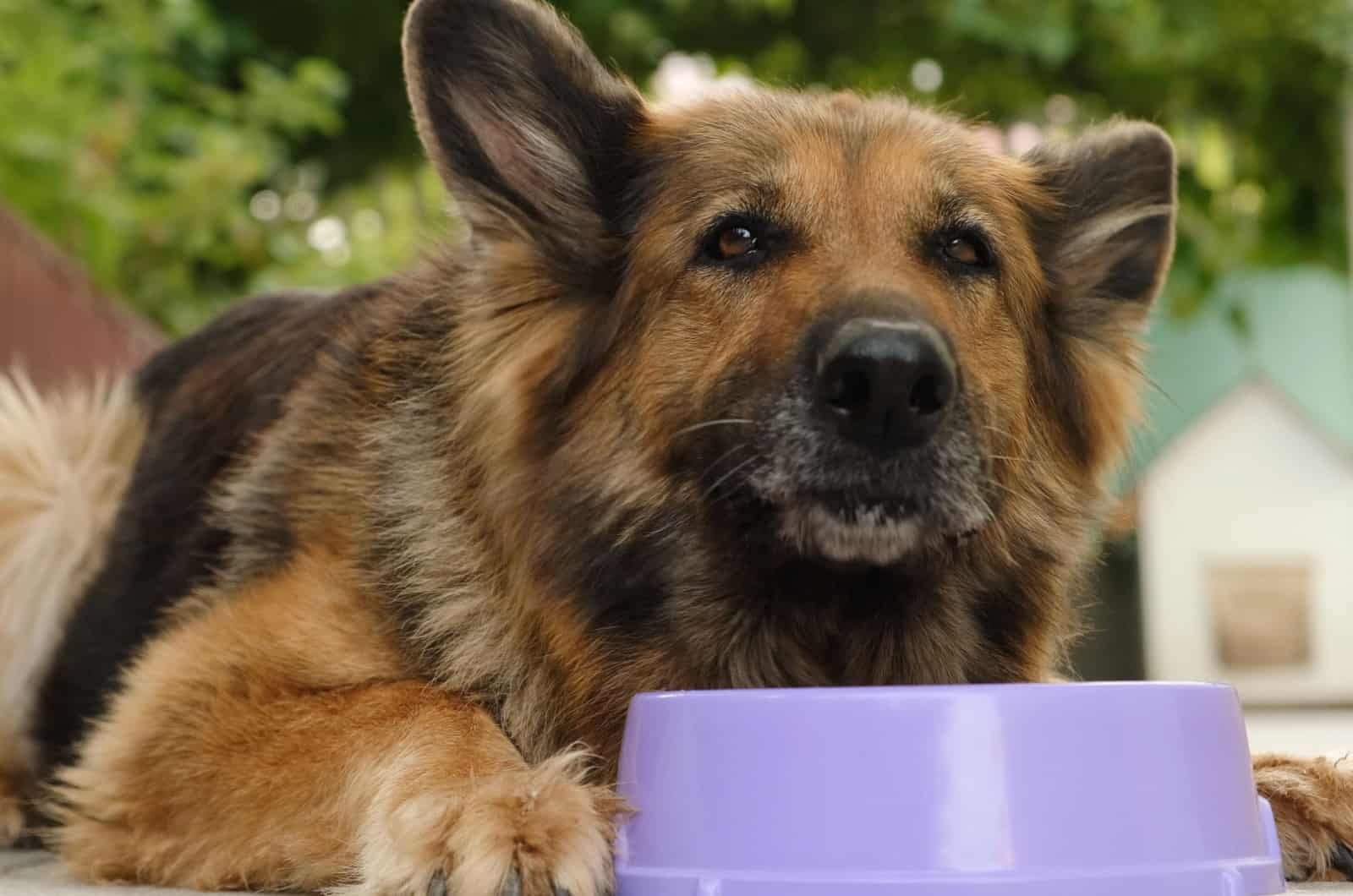
Yes, absolutely!
German Shepherds belong to the group of working dogs with high energy levels and high nutritional needs. They need meals that will keep them nice and full, packed with energy so they can perform their tasks well.
Sometimes, dog kibble just won’t do the trick, and your GSD might become hungry earlier than his next scheduled meal. Enter raw meals!
A raw food diet for your German Shepherd might seem like the ideal one.
Pay attention to the body physiology of a GSD. Doesn’t he remind you of a certain wild animal? That’s right… the wolf!
After all, dogs are descendants of timber wolves. They have evolved throughout history, but certain traits remained, including preferences for raw meat.
All dogs, including our GSD, chew their food in a chop-chop motion. They have pointy teeth and jaws that can only go up and down. They can’t chew on food like humans. This makes them ideal candidates for eating primarily meat.
Also, dogs have more stomach acid, which helps them digest animal meat faster than humans do.
I’m aware that dogs these days will eat pretty much anything they’re allowed to. However, they’re designed to be fed with meat, and you should allow them such preferences.
I haven’t seen a vegan dog that has gone vegan just because he likes veggies more than meat. It’s not natural for dogs to feel that way. We will discuss veganism and dogs later. But, for now, all I want to point out is that eating meat is something written in a dog’s DNA, and it can never be erased.
What Are The Benefits Of A Raw Diet For Dogs?
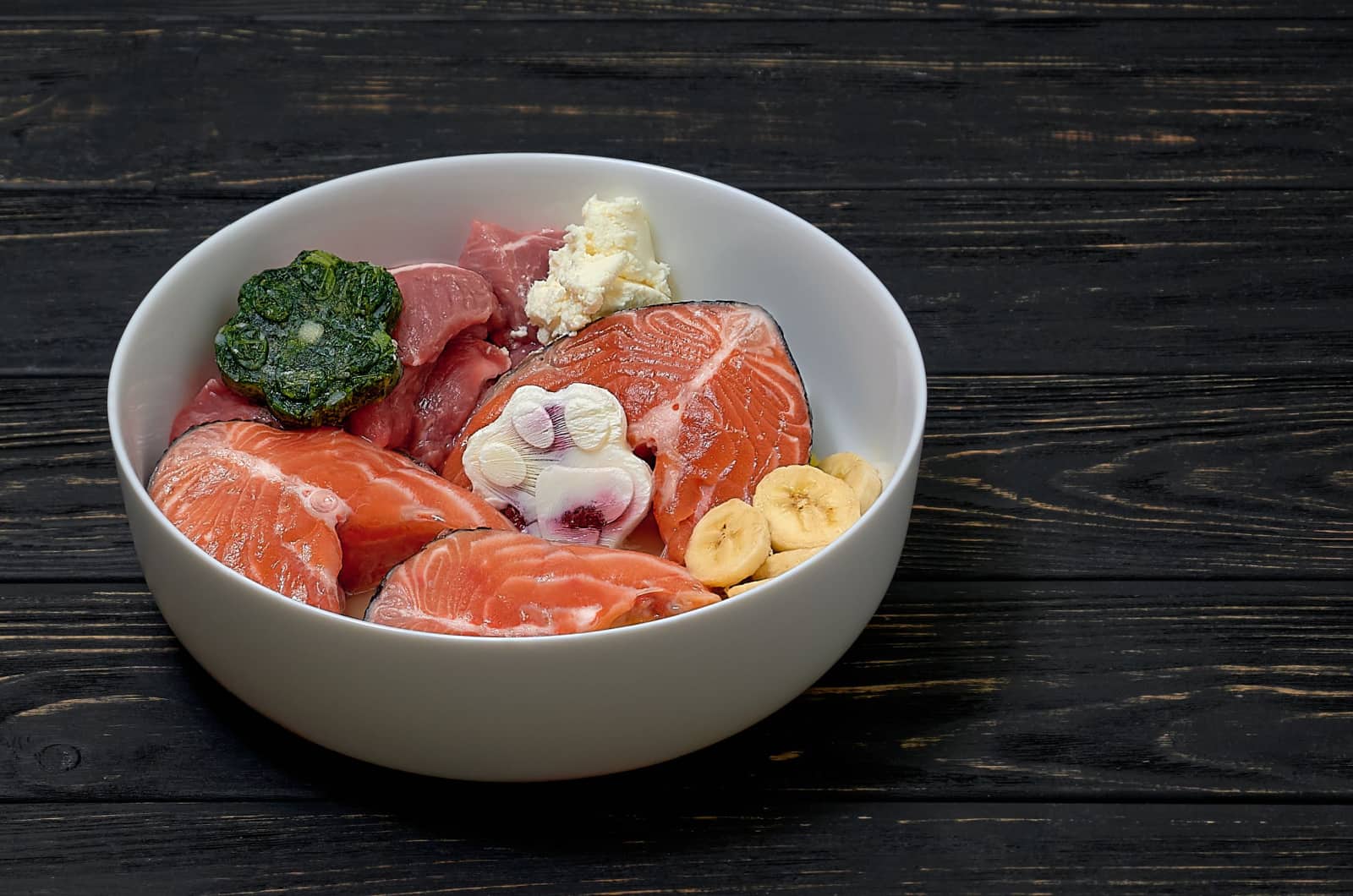
Oh, where to start?
If you want to switch from kibble to German Shepherd raw diet meals, then you should know all the juicy details and all the benefits of such a diet. Trust me… there are lots of them!
For starters, eating raw food for a significant period of time will improve the overall health of the dog. Fresh food will support a shiny coat, elastic skin, build up lean muscles, sharpen up those teeth… raw meals will benefit your dog with both visible and non-visible improvements.
A dog that loves eating raw is more likely to have a stronger immune system, better digestion, and less chance of getting any kind of allergy.
The first notable signs that a raw diet is working is definitely the abundance of energy the dog now has, as well as better agility.
Speaking of allergies…
The German Shepherd is a breed of dog that is highly prone to getting allergic reactions or CAFR, Cutaneous Adverse Food Reactions. Those reactions come from eating something in store-bought kibble that just doesn’t suit their tummy.
Store-bought kibble may contain lots of carbs, which can add lots of weight to your GSD. If you feed your GSD too much, he will become obese and risk osteoarthritis, elbow dysplasia, hip dysplasia, and general bone and joint fragility.
Large dogs are always at risk of mobility problems. They really don’t need any extra pounds.
Other Significant Benefits
The benefit of knowing what you feed your dog is absolutely amazing.
You can pick the right ingredients for your GSD, reduce the chance of him getting in touch with ingredients he’s allergic to, and include only the best stuff in his meals. This means more fresh ingredients, more superfoods, and more health coming their way.
Raw dog food meals contain no fillers, artificial flavors, colorings, or preservatives. They’re 100% natural, and can only make your dog healthier.
Lastly, I want to point out something some of you may think is either an advantage or a disadvantage. A raw diet takes time to prepare. But, you can also buy ingredients in bulk, make a bunch of meals in advance, and always have a healthy meal ready for your dog.
And, you’ll never have to experience a shortage of a specific kibble! Just how many times have you seen a dog food listed as “out of stock” and you were short on it? No more driving around trying to find that brand. No more kibble being discounted, changing the formula, etc.
With raw meals, you’re always safe to go!
What Are The Downsides Of A Raw Diet?
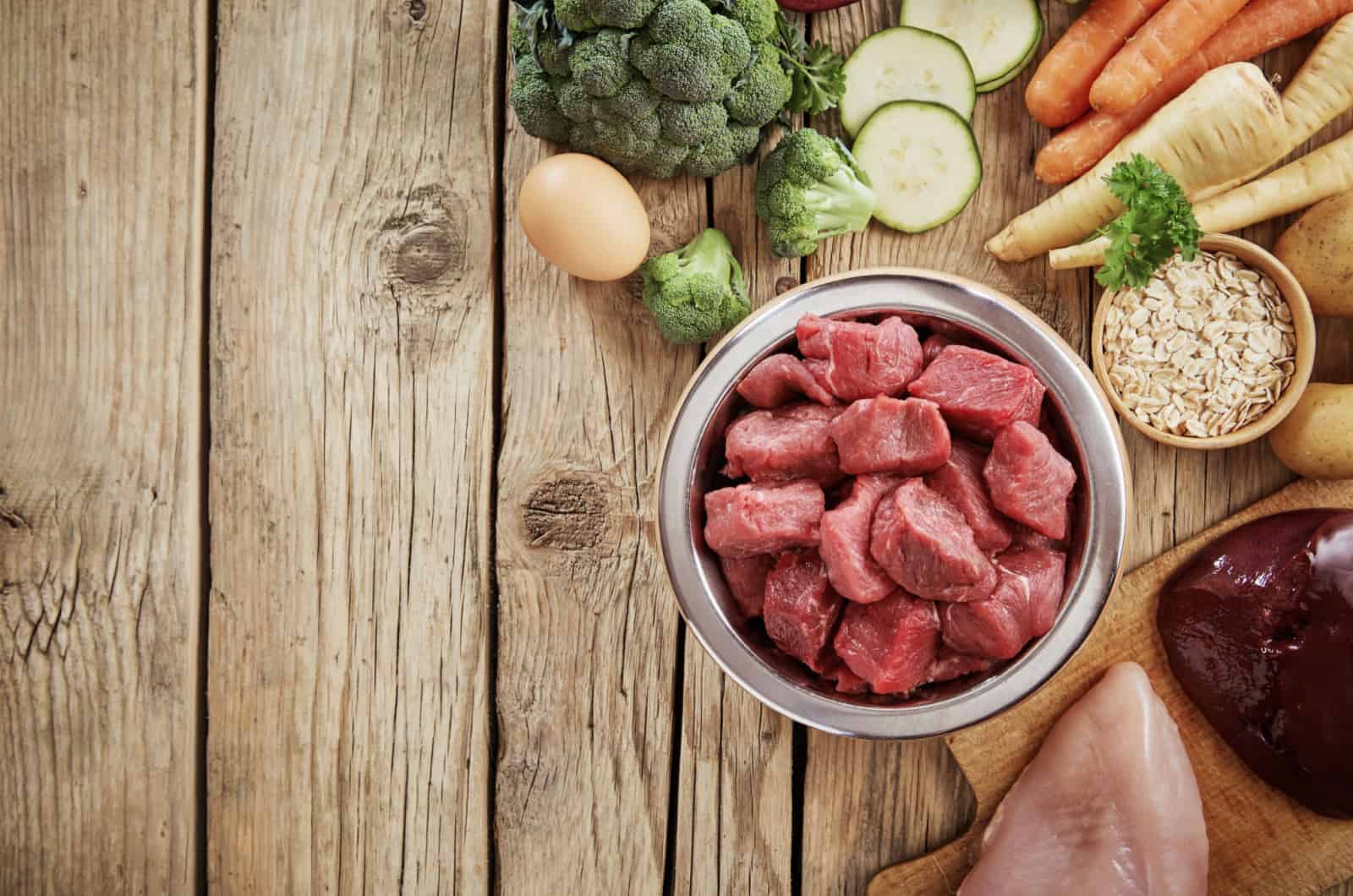
Everything in life has benefits and downsides.
I’m not listing these as something to scare you and chase away your German Shepherd from a raw diet. You must be aware that a raw diet comes with certain risks that should make you more cautious.
Probably the biggest downside of them all is the price. Raw ingredients can be pricey. But, if you find a good local butcher or buy meat in bulk, you can save a pretty penny. It may sound like a lot of money at first, but think of the many benefits that cooking for your dog brings.
Also, preparing raw meals takes time. I know all of us are in a hurry. We all live busy lives. But, if you can’t devote time to your dog, even if it means preparing a meal for him, then you don’t need one… I’m sorry.
Besides these downsides, there are others that may affect the health of your dog, but luckily, they can be prevented.
You see, handling raw meat can put you and your dog at risk of getting salmonella or E.Coli. These bacterias love fresh meat, especially if it’s not stored properly. Still, there are ways to prevent these bad bacteria from crossing your path.
It is scientifically proven that salmonella hates cold temperatures. A lot of dog owners who conduct a raw diet have found that freezing the meat for several weeks before eating it reduces the chance of getting salmonella significantly.
Before you prepare your dog’s meal, wash your hands, use gloves, and wash every part of the meat that goes into the recipe. Also, don’t buy meat from suspicious sources. Every family should have a trusted butcher no matter if the meat is for them or for their dog.
Lastly, I want to shine the spotlight on feeding bones to your dog. Don’t offer pieces that are too large or too sharp as they can hurt your dog. Cooked bones are also a big no because they splinter easily. If you can, grind the bones into the meal. There are still yummy goodies inside them!
How Nutritious Is A Raw Diet For Dogs?
You can ask a lot of things about a raw diet, but you should never doubt if it’s nutritious for your dog.
The whole point of preparing homemade, raw meals is to make your dog’s diet more nutritious. Both small and large-breed dogs can enjoy raw feeding, but only if it’s a balanced diet.
What does a balanced raw diet mean? What should be featured in a raw meal in the first place?
Any good raw meal should feature raw meat or raw animal proteins as the first ingredient. Make sure the percentage of raw meat is 70% or even more. This is to ensure that the dog is getting enough proteins to function well on a daily basis. Pick lean, muscle meat as the finest source of nutrients.
Followed by proteins come cooked or raw bones as an excellent source of calcium and phosphorus. This should not exceed the recommended 10%. We want our canine buddies to have strong bones and joints, don’t we?
Next, we have something that won’t amaze you… animal liver. But, the 5% in every meal should amaze your dog. Animal liver is packed with nutrients such as zinc, folic acids, amino acids, iron, and vitamins A, B12, and B6. You may find it gross, but your GSD will love it!
Other organ meats such as kidneys, lungs, spleen, tripe, heart, brain, tongue, etc. should cover the recommended 5% of the meal. They’re listed to enrich pet food with vitamins and minerals.
Lastly, we have the 10% that covers fruits and veggies. We will discuss which fruits and veggies dogs should eat down below in this article. But, for now, you should know that they provide much-needed antioxidants, flavonoids, carotenoids, and other phytochemicals.
I didn’t purposely mention grains because some dogs aren’t supposed to eat them. Include them in your German Shepherd’s raw diet only if your dog isn’t allergic to soy, wheat, or corn. And, of course, be careful and dose them because they have lots of carbohydrates.
Meal Sizes: How Much Raw Food Should You Offer Your GSD?
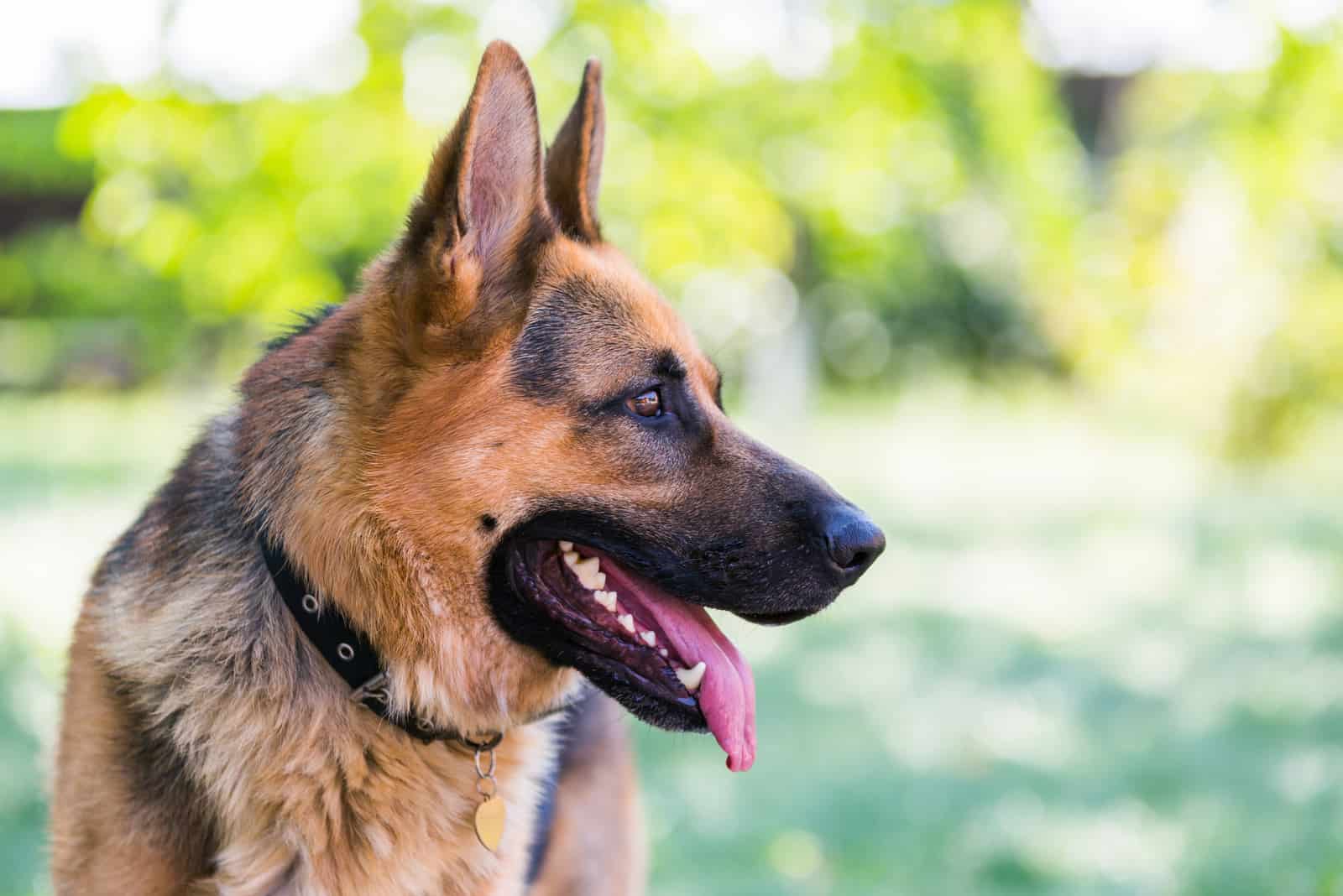
German Shepherd dogs can eat a lot, but that doesn’t mean you should give them all the food they want on a daily basis. Every dog needs just as much food to satisfy its energy levels.
After all, have you ever seen a fat German Shepherd? Yeah, me either! These dogs like to stay active, and they rarely snooze inside the house, putting on extra pounds.
So, how big are those daily meals for a German Shepherd?
Every dog owner who uses a raw diet for their German Shepherd uses the body weight percentage method to figure out how much food his GSD needs.
This means you should feed your GSD 2% to 4% of its ideal weight as an adult.
But, the percentage is not the same for every GSD. Certain life stages require different percentages. For example, older dogs need only 1.5% to 2%.
Underweight dogs need 4% of the food, which is the maximum.
To help your GSD maintain a proper weight, go with 2% to 2.5%.
Here’s some basic math to help you understand this method better.
Let’s say your GSD weighs approximately 65 pounds. If you own a happy, healthy dog, then you should multiply the weight by 2% or 2.5%. If you pick the maximum percentage, then in this case, your dog should consume 1.625 pounds of food.
Since it’s always a good idea to feed more meals instead of just one, divide this amount of raw food into two or more meals depending on what your dog needs.
Always remember to follow the general BARF diet rules, and include 70% of lean meat in your dog’s meals.
Puppyhood And German Shepherd Raw Diet Habits
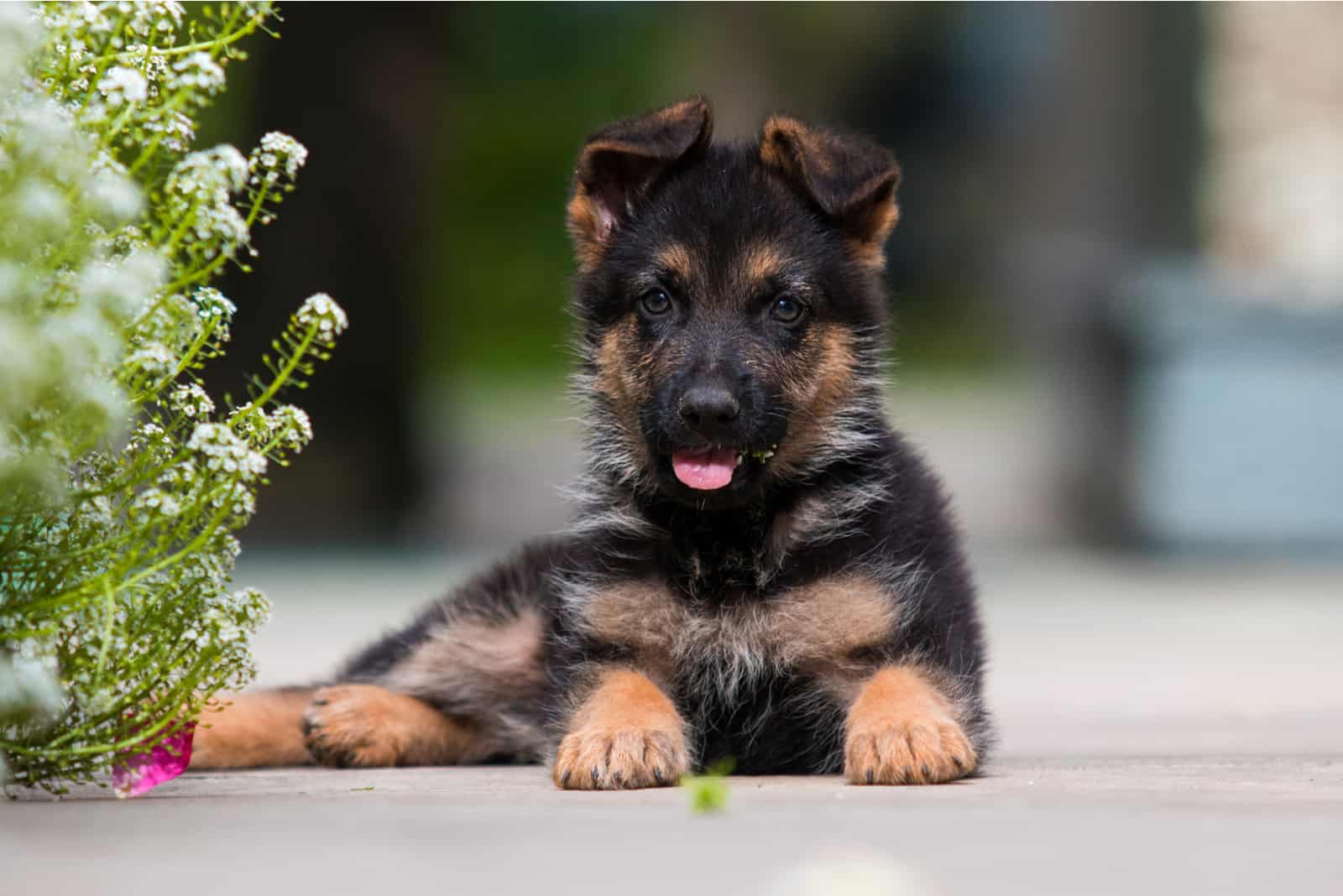
As I mentioned previously, different life stages come with different food requirements. Of course, adult dogs won’t eat the same amount of food as a German Shepherd puppy. But, the difference is in quantity, not quality.
German Shepherd puppies still need high-quality raw dog food to help them grow up nicely. I see many breeders these days introducing a raw diet from an early age. The many benefits over dry food have made the raw diet a favorite among all dog owners.
German Shepherd puppies will need more proteins, as well as more phosphorus, calcium, and healthy fats (fatty acids like omega-3) for proper development.
This means your dog will need 15% of meaty bones, and 20% of fat to have a balanced meal.
I’ve seen breeders who wean puppies and transition them straight to raw meals. However, not every puppy will like it, so either learn how to make puppy mush here or combine raw food and kibble for an easier transition.
By the time your GSD doggy turns 12 months of age, he should be ready to fully transfer to a raw diet.
You can either read this article on feeding raw food to puppies or use the same method of calculation for the ideal meal quantity. However, in their case, puppies will need 5% to 10% of their current body weight.
Small puppies up to the age of three months will need 8% to 10%.
Older puppies, as they turn 12 months of age, will need 3% to 4% of their weight. These are daily requirements, so stick to them.
Puppies also eat more meals than adult dogs. This suits their digestive tract better, and helps them have a healthy digestive system, free of obstructions.
German Shepherd Raw Diet: Should You Add Dietary Supplements?
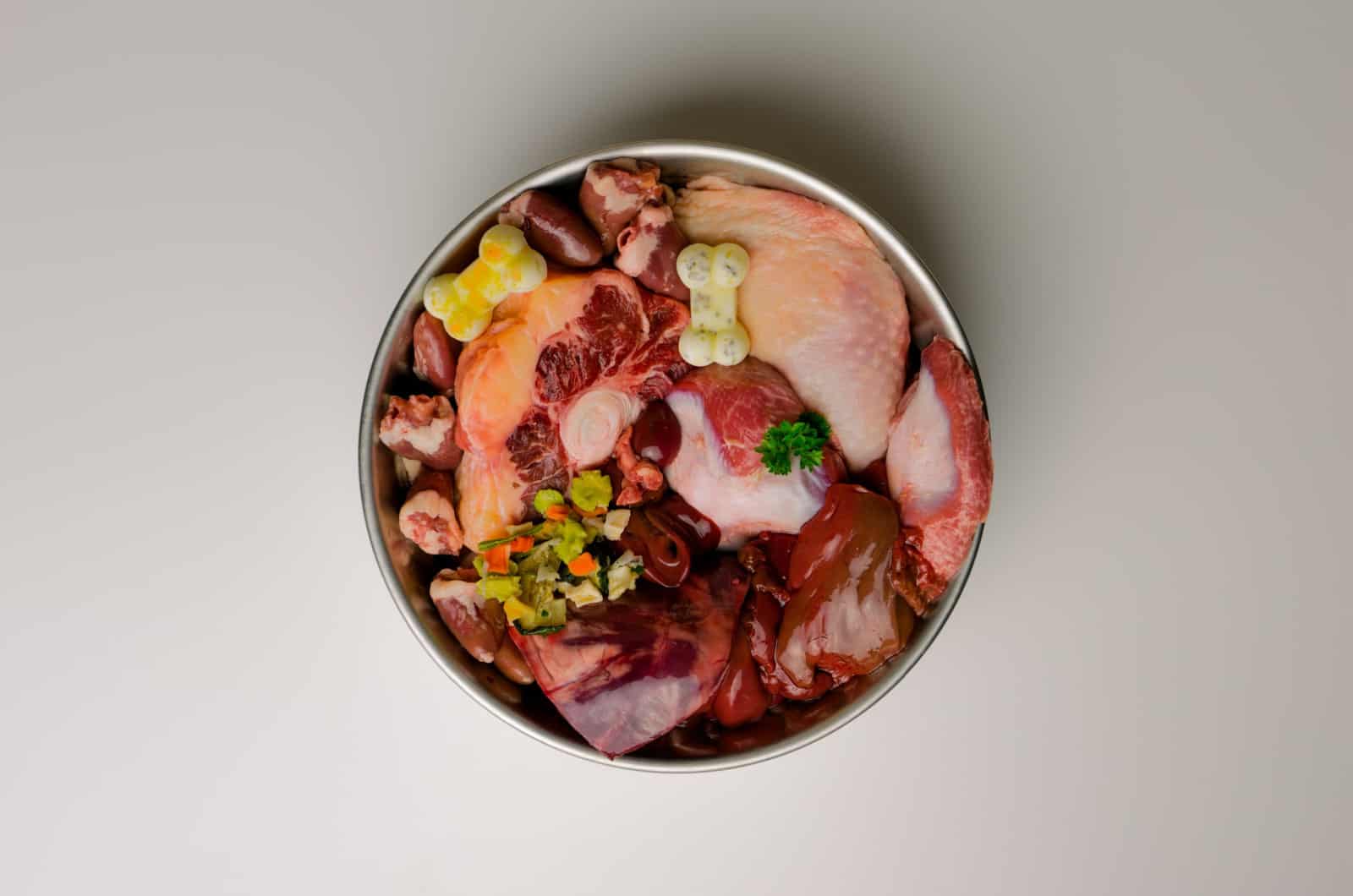
Adding supplements to our diets has become a thing lately.
I get it… we’re all too busy to eat a balanced meal, so we need supplements.
But, do our canine buddies really need dietary supplements if they’re eating raw?
If a dog is completely healthy, without any food allergies or conditions that would require a change of diet or specially-designed recipes, then he doesn’t need food supplements.
You don’t have to add calcium, for example, to your dog’s meal if it already contains ground bones or dairy products. You can’t find a better calcium source than those two!
However, this rule applies only if you know you’re feeding your dog a balanced meal that is rich in all the nutrients he needs. That’s why you should keep your dog updated on the diet you’re letting him have. If your vet notices any lack of nutrients, he will prescribe a supplement for your pooch or suggest how to enrich his diet the natural way.
Never add supplements without consulting your vet first. Too many supplements can equally disturb your dog’s health just as any other unwanted ingredient.
When Is A German Shepherd Raw Diet Not Advised?
A German Shepherd raw diet is great, but only if your dog is fully healthy.
Sadly, German Shepherds are at risk of developing kidney and liver problems, and such dogs shouldn’t consume a raw diet. Still, there are recipes for raw meals approved by the vet, so your pup with kidney issues can have them, too.
Here’s a simple explanation: a raw diet is highly rich in proteins, and such a diet can make liver or kidney conditions even worse.
For example, our Dalmatian buddies suffer from kidney conditions, and they must be careful about which proteins they consume.
Also, if your GSD has cancer and is going through chemo, or simply has issues like pancreatitis, it would be better to stay away from raw food.
Otherwise, you’ll see your dog experiencing severe issues, vomiting yellow bile, feeling down, etc.
Human Foods Your Dog Can And Cannot Eat

I love adding human foods to my dogs’ diet!
However, I’m not talking about fast food or spicy food because that’s what dogs don’t eat. Trust me… my dogs have tried to sneak a few bites off my plate, especially when I’m eating sushi, but they didn’t manage it. I don’t want to think what would happen if they’d consumed wasabi since it’s so bad for them!
Anyway, I’m talking about good fruits, veggies, and products they can use as treats or as a part of their meals.
PupVine is really proud of our food articles. We’ve done a fair share of dos and don’ts of human food, so you can always check out our base for useful information.
In case you’re wondering, here are human foods that must be off limits for GSDs and all other dogs:
pesto, etc.
Of course, there are some foods that can be fed to your canine buddy, such as:
Brussels sprouts, etc.
Can A German Shepherd Raw Diet Mean Vegan Food?
We’re all aware by now of how healthy meat and raw meals are good for German Shepherds. However, this doesn’t mean that all GSDs can munch on chicken carcasses, for example.
Some dogs can actually be allergic to meat.
Although you may not realize it, chicken is definitely the biggest allergy trigger for dogs. Sure, grains are also here, but chickens are often fed poorly with antibiotics and growth supporters. Just imagine the quality of such meat! Even your dog won’t like it.
Some dogs are also allergic to uncommon meat sources like venison and lamb. These sources of proteins can cause severe health issues, and it’s best to have them removed from your dog’s diet.
If your dog is fully allergic to meat, he can go vegan. Still, you’ll need to consult your vet and have him help you figure out the right diet for such a dog.
Sometimes, dogs will be allergic to all kinds of meat, but won’t be allergic to fish. So, instead of going completely vegan, they can go pescatarian, which is also quite beneficial.
I’m sorry if this may sound a bit too harsh. Trust me… I have nothing against your beliefs. If you’re a vegan and you want your dog to be one, too, even if he has no health indications to go vegan, please don’t do it.
You may cause your dog more harm, and that’s definitely not something you want, right?
Top Three Homemade Recipes To Prepare For Your German Shepherd

So, you’ve been to the grocery store and you have lots of amazing ingredients back at home. How about you prepare some delicious meals for your canine buddy? I bet those chicken necks would make a terrific raw meal. Oh, and those liver bits would be an awesome follow-up ingredient in a doggy hamburger meal!
Ingredients like tripes have lots of beneficial enzymes. They may disgust us, but dogs love them!
What’s so great about making doggy meals at home is that you experiment with pretty much everything from the allowed food list. Your dog won’t mind if you combine blueberries and broccoli. They love food no matter what it is.
If your dog is gluttonous, then you can wake up the little canine chef inside you and create interesting meals.
Want to see more interesting doggy recipes? Keep on reading…
Turkey Loaf
Of course, your dog can have a meatloaf Sunday dinner!
In this case, we’re using ground turkey. I’m not going to tell you measurements, so you can make as much as you want. However, please remember the recommended percentages. Always put proteins first, so they cover 70% of the meal.
Mix together ground turkey meat, some raw eggs, a bit of olive oil for better digestion, and chopped up carrots and zucchini. It should become a compact mass, ready for you to either bake and serve to your dog, or freeze raw and cut into pieces for easier dosage.
Beef Stew
This next recipe is one of the easiest ever.
I love making it for my dogs because it can be done quite fast, and it features lots of great, beneficial ingredients.
Simply chop up and cook beef meat in cubes, add sweet potatoes, carrots, a few kidney beans, broccoli, and brown rice. The whole meal should be done in under thirty minutes. And, let me tell you something… it disappears within seconds!
This recipe is quite flexible. Instead of beef, you can add lamb and make lamb stew.
Chicken Soup
I hope you know how to cook chicken for your dog. In case you don’t, here is a good heads-up.
Of course, this isn’t real soup, but it does feature all the ingredients I’d put in real chicken soup.
Every time I have a whole chicken back at home, I like to cook it up, add some chicken broth I always have ready, then some carrots, peas, zucchini, parsnip, and broccoli. It gets cooked very fast, and my dogs love it!
If you have extra time, please make chicken broth from scratch at home. The bones from the chicken are an excellent source of chondroitin and glucosamine, and your GSD really needs them.
Conclusion
The German Shepherd raw diet is highly beneficial for your German buddy. From good dental health to an excellent immune system, a shiny coat, and overall good feeling – this diet has an impact on everything.
Personally, the raw diet is something I love. My dogs, one of them being a GSD, absolutely adore it. It’s so much better than the stuff I used to buy off Amazon.
I’m not saying that all dog food brands are terrible. We have some pretty incredible ones on the market. But, I know what’s good for my dogs.
Do you know what’s good for your GSD?
Until next time, my pups and I say hello, and want you to join us in the club of raw diet lovers!
Read Next: The German Shepherd Ears Chart: 7 Things You Need To Know
